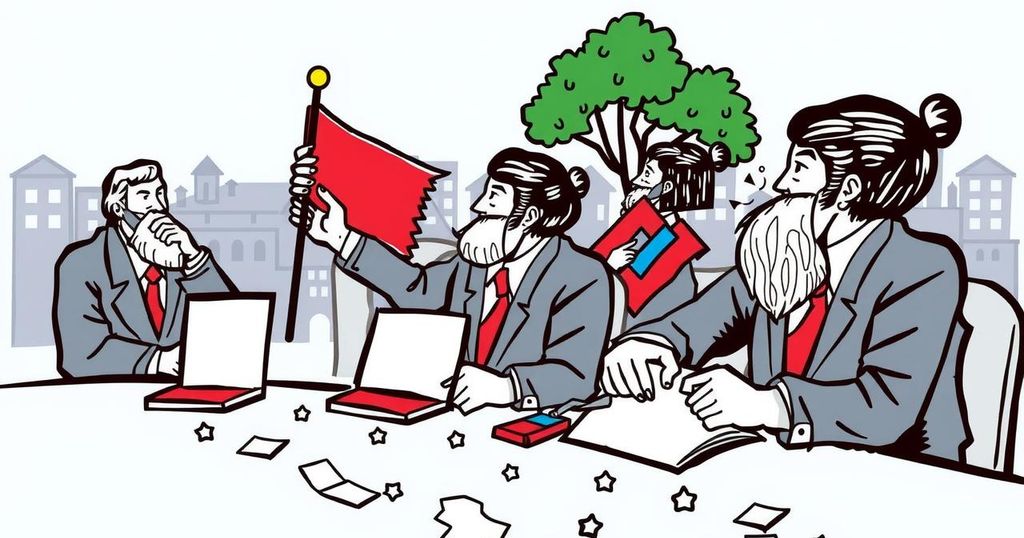Climate change
AFRICA, ASIA, AZERBAIJAN, BAKU, CLIMATE CHANGE, EGYPT, ENVIRONMENTAL POLICY, EUROPE, FLORIAN IRMINGER, GLOBAL CITIZEN, GREENHOUSE GAS EMISSIONS, HUMAN RIGHTS, IRMINGER, PARIS AGREEMENT, POLAND, PROGRESS & CHANGE ACTION LAB, QATAR, SOVIET UNION, UAE, UN, UNITED ARAB EMIRATES
Isaac Bennett
0 Comments
COP29’s Civic Space Crisis: Challenges for Future Climate Dialogues
COP29 in Baku, Azerbaijan, has been marred by a significant crackdown on civic space, with over 300 political prisoners detained and civil society members facing repression. The increase in political prisoners has heightened concerns over the implications for climate negotiations, as authoritarian practices have historically sidelined environmental defenders. Initiatives aimed at integrating civil society perspectives continue to confront significant challenges, necessitating reform in how future climate conferences are hosted.
The recent COP29 climate conference, hosted in Baku, Azerbaijan, has been overshadowed by a significant crackdown on civic space, exemplified by the current detention of over 300 political prisoners in Azerbaijan. Despite calls for substantial climate finance and actionable plans to phase out fossil fuels, participants from civil society faced increased repression leading up to the conference. Reports indicate that the number of political prisoners surged by 243% since February 2023, following Azerbaijan’s selection to host the COP. Human rights organizations highlight a chilling atmosphere where members of civil society have either fled or been arrested under oppressive laws targeting their environmental and human rights advocacy.
Azerbaijan’s history of repressing dissent and critical voices poses a significant challenge for global climate negotiations, as evidenced by the treatment of civic defenders. Rights advocates, such as Florian Irminger, have voiced concerns about the precedent being set for future authoritarian regimes aspiring to host such conferences. The longstanding tradition of sidelining civil society has direct implications for transparency and accountability in climate discussions, particularly in the face of oil-rich states prioritizing fossil fuel interests during their respective conferences.
Despite some efforts to include civic perspectives, meaningful engagement remains limited. Initiatives like the Climate of Justice Initiative aimed to shine a light on human rights abuses yet faced immediate backlash, exemplified by the recent arrest of Anar Mammadli, a prominent advocate for democratic elections and environmental justice in Azerbaijan. His experience underscores the ongoing struggle for independent scrutiny and the need for broader participation by environmental defenders in climate policy formulation.
The global community must recognize and address these abuses by ensuring that future COPs are held in nations that respect civic freedoms. A concerted effort from the UNFCCC is required to uphold international human rights standards during these crucial negotiations. With Brazil set to host COP30, there is potential for increased involvement of Indigenous voices and a shift towards inclusivity in future discussions. It is crucial to prioritize these perspectives to advance global climate objectives effectively, as suppressing dissent ultimately undermines the integrity and efficacy of climate action.
The article focuses on the implications of Azerbaijan’s authoritarian governance on the COP29 climate negotiations, emphasizing the adverse effects on civil society and environmental human rights defenders. In the lead-up to COP29, Azerbaijan experienced a remarkable increase in political repression, resulting in a dramatic rise in political prisoners. These developments highlight the broader issue of how hosting climate conferences in repressive states can hinder meaningful dialogue on climate issues, particularly when civil society is marginalized and silenced. Historical precedents demonstrate a trend wherein authoritarian regimes utilize conferences to mask human rights abuses while advancing their fossil fuel agendas.
This analysis illustrates the pressing need to reevaluate the selection of host countries for future climate conferences based on their respect for human rights and civic freedoms. Azerbaijan’s hosting of COP29 not only demonstrates significant limitations to civil society participation but also signals a troubling trend that may allow similar regimes to inhibit climate discourse. The international climate community must advocate for inclusive, transparent discussions that empower all voices, particularly those of marginalized communities, to ensure comprehensive and equitable climate strategies moving forward.
Original Source: www.globalcitizen.org




Post Comment